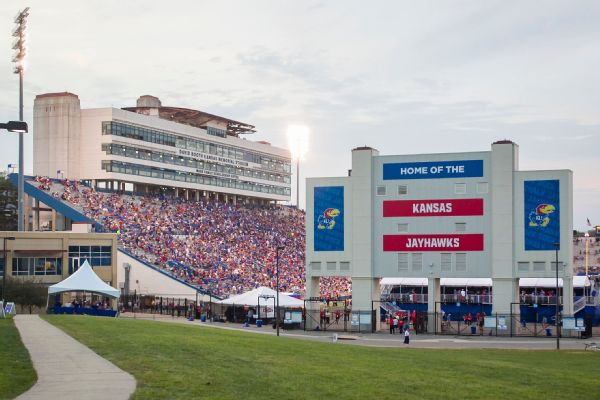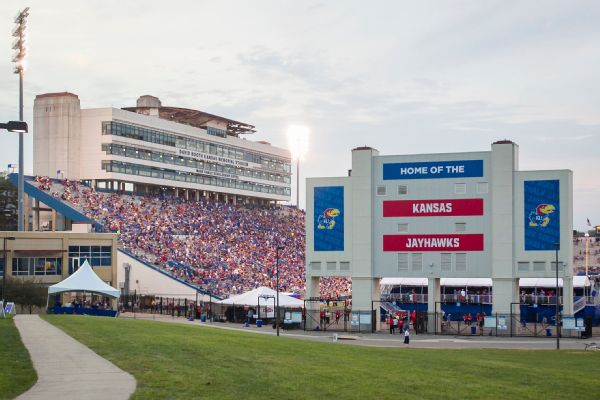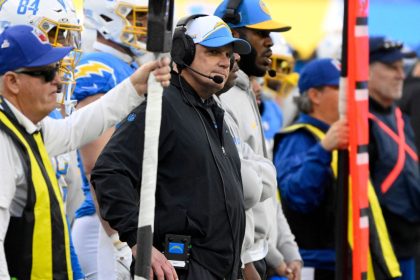

LAWRENCE, Kan. — The University of Kansas will begin sweeping renovations to Memorial Stadium and the Anderson Family Football Complex at the end of the football season, representing the first steps toward a new multiuse district on the edge of campus.
The school said Tuesday that it has set an initial fundraising goal of $300 million for the football changes and upgrades to Allen Fieldhouse, the historic home of the Jayhawks’ basketball programs, which have already begun. The school said that private funds will cover most of the project and that it already has secured about $165 million in gifts and commitments.
The school also received $35 million in ARPA funds appropriated by the Kansas legislature and will receive up to $50 million through the Kansas Department of Commerce’s University Challenge Grant program.
“The Gateway District is a once-in-a-generation project to transform our campus and drive economic development throughout the region,” said Kansas chancellor Douglas Girod, who was joined by Kansas Gov. Laura Kelly, Jayhawks athletic director Travis Goff and football coach Lance Leipold for a news conference unveiling the latest plans for the project.
“It’s a great day for the university but really the community, our region and our state,” Girod said. “This is a project we have talked about for quite some time but really have moved toward reality in the last year or so.”
The first phase will include additional renovations to the Anderson Family Football Complex, which just weeks ago unveiled new locker rooms and training spaces, and construction on the southwest, west and north sides of the football stadium that includes a new conference center. The work will begin after the coming season and will be completed by the start of the 2025 season.
The school has been trying for more than a decade to overhaul its football stadium, which is far below the standards of rival schools in the Big 12. But changes in the athletic administration, coupled with overwhelming fan apathy for a perennially poor football program at the basketball-mad school, had made it difficult to build support.
That changed with the arrival of forward-thinking Goff, who not only pushed the project forward but also hired Leipold, who last year led the Jayhawks to a .500 regular-season record and their first bowl game since the 2008 season.
“We have a proud history,” Goff said, “but this unprecedented investment makes a powerful statement about an even brighter future and provides far-reaching impact for our university community, fans and football program.”
Goff said that seating in the bowl area would be about 100 feet closer to the field — a significant gap has existed ever since the school removed the old running track — and that about 70% of the stadium will be replaced. The construction will force Kansas to play with a dramatically reduced capacity next season, but games will still be played at Memorial Stadium.
“We will have in essence a new football stadium,” Goff said.
The construction is about more than just the football program, though.
Future phases will overhaul the south and east portions of the stadium but also will develop multiuse spaces that include a mix of amenities — such as retail spaces, entertainment venues, office spaces and lodging — that can drive year-round revenue.
“This project will help us continue to meet all our missions and grow in every single way,” Girod said. “As I told someone earlier, every project has its time. And this is a project that we’ve been talking about — we had a big announcement two weeks before I took this job, and that was seven years ago. We needed the right time and the right leaders, and we have that.”
“Really excited to be at this point,” he said. “We know this is going to be game-changing for us.”










